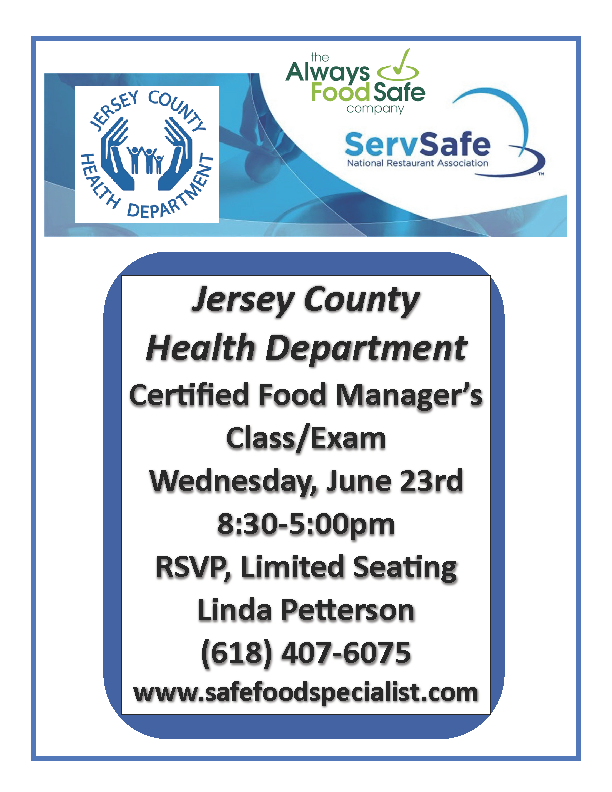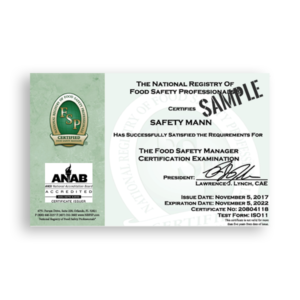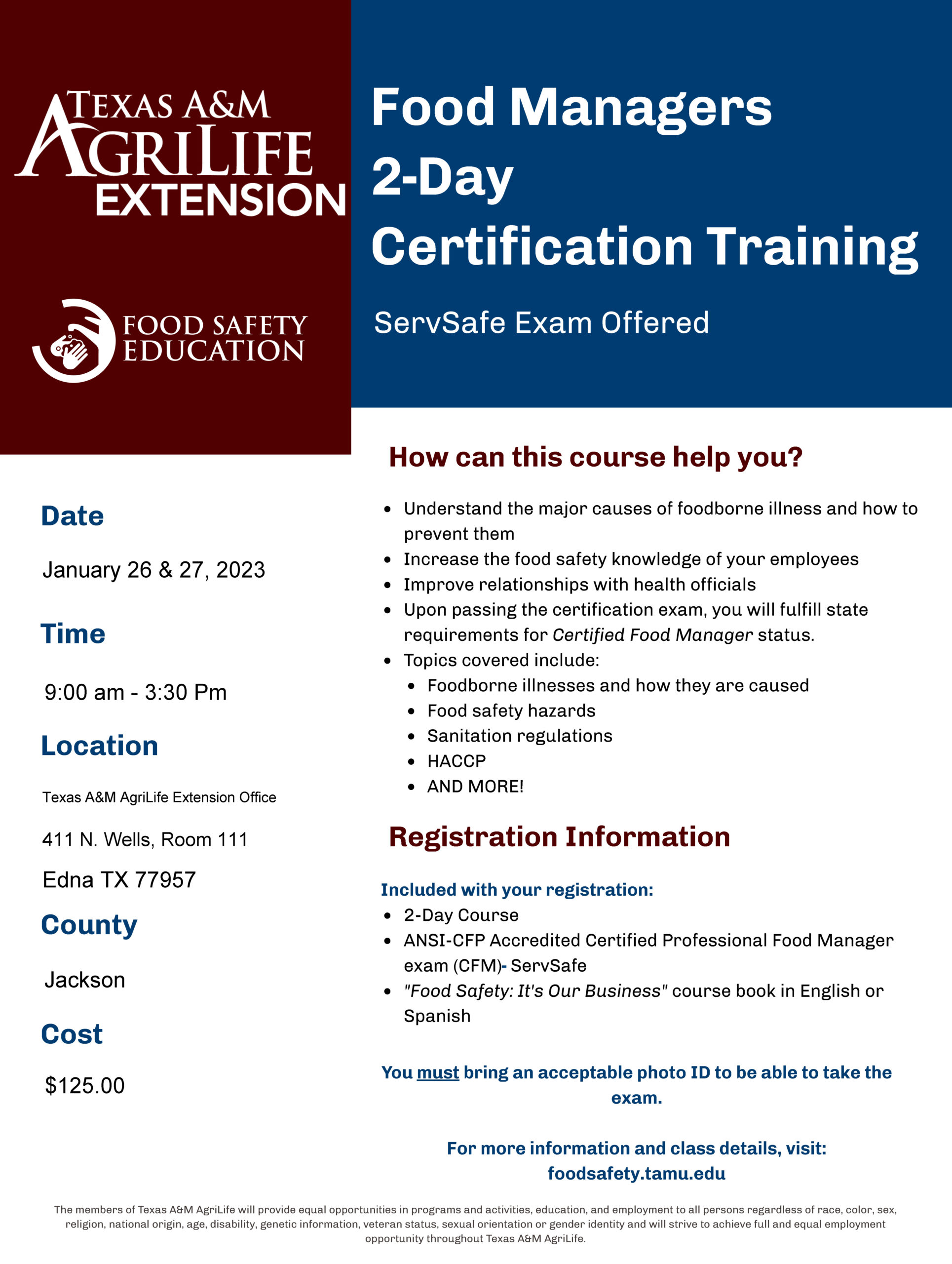Step-by-Step Overview to Food Manager Accreditation for Professionals
Achieving Food Supervisor Certification is a crucial step for experts in the food service industry, making sure compliance with wellness policies and boosting operational effectiveness. The process starts with fundamental prerequisites, consisting of educational background and appropriate experience. Following this, candidates are urged to involve with a variety of research study products and resources to plan for the certification exam efficiently. Nonetheless, the journey does not end upon passing the exam; preserving qualification entails continuous education and learning and recognition of developing regulations. Recognizing these nuances is important for any expert aiming to master this crucial area of food security management.
Understanding Food Manager Qualification
What does it mean to hold a Food Supervisor Qualification, and why is it essential in the food solution sector? A Food Supervisor Certification symbolizes that an individual has gotten the knowledge and skills needed to guarantee food safety and security and hygiene in various food service settings. This qualification is important as it demonstrates a dedication to adhering to health policies and ideal methods, which eventually safeguards public health and wellness.
Foodborne ailments posture significant risks, and the certified supervisor plays an essential duty in reducing these dangers via appropriate food preparation, handling, and storage space methods. The certification process involves extensive training in essential locations such as food security legislations, sanitation techniques, and employee training. It likewise outfits supervisors to successfully supervise staff and execute food safety and security programs, making sure conformity with national and local food safety and security criteria.

Requirements for Qualification
Prior to seeking a Food Manager Certification, prospects have to fulfill specific requirements that guarantee they are prepared for the strenuous training and assessment process. Firstly, candidates ought to possess a senior high school diploma or comparable educational history, as this foundational knowledge is crucial for recognizing food security principles and guidelines.
In addition, candidates commonly need to have some experience operating in the food service sector. This experience assists to contextualize the academic understanding gotten during the accreditation training. Numerous accrediting companies recommend a minimum of 6 months to a year of practical experience in a food facility.
One more essential prerequisite is age; prospects must generally go to least 18 years old. This age requirement lines up with the responsibility related to food safety monitoring. Furthermore, people must show fundamental proficiency and numeracy abilities, enabling them to comprehend products and complete practical analyses efficiently.
Last but not least, while not mandatory, completing a food safety and security training program before accreditation can dramatically improve a candidate's preparedness. By fulfilling these prerequisites, prospects are better positioned to do well in their Food Supervisor Accreditation journey.

Research Products and Resources
With a strong foundation established with the prerequisites for Food Manager Certification, prospects can now concentrate on the study materials and sources that will certainly assist in their preparation. A range of academic devices are available to make sure thorough understanding of food safety and security principles and laws.

First, it is important to get an identified Food Supervisor Accreditation book, which covers subjects such as foodborne health problems, individual hygiene, and safe food taking care of methods - ServSafe Manager. Numerous organizations provide study overviews customized to the particular certification examinations, which can act as very useful references
Online courses offer interactive discovering experiences, typically including quizzes and practice tests that reinforce crucial concepts. In addition, webinars and video tutorials can boost understanding of complicated topics, permitting prospects to find out at their very own pace.
Joining expert networks or study hall can additionally be valuable, as they help with expertise sharing and offer support from Click Here peers. Utilizing method tests can assist candidates familiarize themselves with the test format, recognize understanding gaps, and develop confidence.
Taking the Qualification Exam
This crucial action in obtaining your Food Supervisor Certification calls for an extensive understanding of food safety and security concepts and techniques. Acquaint on your own with the exam format; most accreditation examinations consist of multiple-choice inquiries that analyze your knowledge of food safety policies, hazard analysis, and correct food handling methods.
On the day of the exam, get here early at the testing area to resolve in and decrease anxiousness. Bring required identification and any allowed products, such as a calculator or notes, as specified by the exam guidelines. During the exam, read each inquiry meticulously and handle your time sensibly-- allot a set period for each and every area to guarantee you can address all questions.
Results may be available immediately or take a few days, depending on the accreditation body. official website No matter of the result, utilize the experience as an understanding opportunity to enhance your food safety and security expertise and skills.
Keeping Your Accreditation
To guarantee the durability of your Food Supervisor Certification, it is necessary to stay educated about the most recent food safety and security regulations and best methods - Food Manager Certification. Food safety and security requirements are constantly advancing, and staying updated will certainly aid you maintain compliance and maintain industry criteria. Routinely review sources from trusted organizations, such as the Food and Medicine Administration (FDA) and the Centers for Illness Control and Prevention (CDC)
In addition, many accreditations need regular renewal, commonly every three to five years. Be proactive in scheduling your renewal before your certification expires. This usually involves retaking the accreditation exam or finishing proceeding education systems (CEUs) that concentrate on food safety and security and monitoring.
Participating in professional development possibilities, such as seminars and workshops, can likewise improve your expertise and skills. Connecting with other food security specialists can provide important understandings and updates on market fads.
Lastly, document all training and connected to food security management. This documentation may be necessary for your renewal procedure and functions as evidence of your commitment to preserving high criteria in food safety. By following these steps, you can ensure that your Food Supervisor Accreditation continues to be valid and effective.
Final Thought

Attaining Food Manager Certification is a vital action for experts in the food service sector, ensuring compliance with health and wellness laws and boosting functional efficiency. A Food Supervisor Qualification signifies that a person has acquired the expertise and skills needed to make sure food safety and security and health in various food service settings. Acquaint yourself with the examination style; most certification tests are composed of multiple-choice concerns that analyze your knowledge of food security guidelines, threat analysis, and proper food dealing with strategies.
To ensure the long life of your Food Manager Qualification, it is important to stay informed regarding the most recent food security regulations and best practices.Achieving Food Supervisor Qualification is a critical action for professionals in the food solution market.